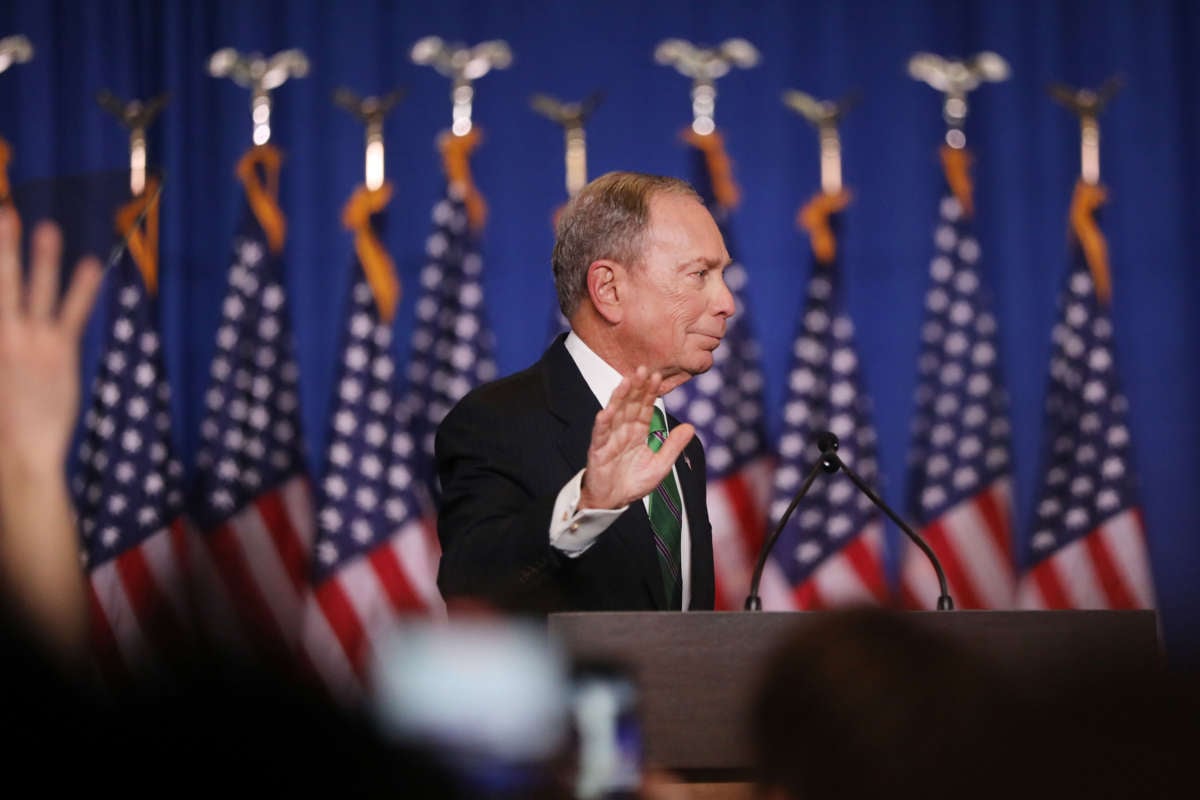Michael Bloomberg dropped out of the Democratic presidential primary Wednesday after his half-billion dollar campaign fell flat on Super Tuesday. Despite spending unprecedented sums on advertising and campaign staff, the billionaire philanthropist didn’t win a single state.
Bloomberg endorsed Joe Biden on the heels of the former vice president’s hugely successful night. Bloomberg initially entered the race because he believed Biden’s cash-poor campaign was all but finished. But with Sen. Bernie Sanders (I-Vt.) winning critical early primary states, moderate candidates exited the race to rally behind Biden. Party officials believe he has a better chance of beating President Donald Trump.
Biden’s Tuesday night was the opposite of Bloomberg’s. Biden won in states where he had virtually no campaign infrastructure while Bloomberg fell to third in states where he had spent millions of dollars on advertising. Biden handily won Minnesota, a state he never visited, thanks to a last minute endorsement from Sen. Amy Klobuchar (D-Minn.), who exited the race Monday. Bloomberg collected just four delegates in Texas after investing nearly tens of millions in the Lone Star state.
The 2020 Democratic primary is already the most expensive ever. But money didn’t win on Tuesday. Months of pricey campaigning and ad spending were seemingly made irrelevant as large swaths of voters switched their choice to Biden in the last few days after his big weekend win in South Carolina.
Shelling out nearly $6 million per day, Bloomberg tops the list of wealthy self-funders whose campaigns flopped at the polls. Right behind him is fellow billionaire Tom Steyer, who dropped out after a disappointing result in South Carolina.
Between the two, Bloomberg and Steyer spent more than the rest of the Democratic field combined, only to collect a measly number of delegates. As of the most recent Federal Election Commission filings, both candidates burned through 80 percent of their budget on media such as television and digital ads for a total of over $520 million.
Bloomberg’s record-breaking spending left a major mark on the race. His unprecedented self-funding effort led other 2020 Democratic candidates to launch aggressive fundraising campaigns and take support from super PACs that they had earlier disavowed.
For instance, Sen. Elizabeth Warren (D-Mass.), a staunch critic of super PAC money, refused to condemn support from Persist PAC, which spent $14.8 million backing her and did not disclose its donors before Super Tuesday.
“We reached the point a few weeks ago, where all of the men who were still in this race and on the debate stage, all had either super PACs or they were multi billionaires, and could just, you know, rummage around in their sock drawers and find enough money to be able to fund a campaign,” Warren said last week.
Bloomberg announced his run for president 100 days ago and skipped the first four primaries, instead pouring millions into Super Tuesday states. The Democratic National Committee — which received six figures from Bloomberg late last year — changed its debate rules to allow him to participate.
The billionaire’s history of large spending for candidates via super PACs helped him get endorsements from dozens of lawmakers. Bloomberg gave over $63 million to Independence USA PAC in the 2018 midterms — many Democrats who benefited from the group returned the favor this presidential race.
Bloomberg never released his tax returns, nor did he file a personal financial disclosure, before dropping out of the race.
Bloomberg hired 2,400 staffers across 200 offices nationwide for his campaign. In January, NBC reported that even if Bloomberg left the race, his team would independently campaign for whoever becomes the Democratic nominee.
“I entered the race to defeat Donald Trump. Today, I’m leaving for the same reason. Defeating Trump starts with uniting behind the candidate with the best shot to do it. It’s clear that is my friend and a great American, Joe Biden,” Bloomberg tweeted, after dropping out on Wednesday.
Bloomberg was the top Democratic donor in the 2018 midterms, giving $95 million, and the third most generous donor this cycle. Those in Bloomberg’s camp have said he could spend up to $1 billion to defeat Trump.
The Sanders campaign said it would reject outside help from Bloomberg in the general election, arguing that it could fund its White House bid entirely through small-dollar donations. Bloomberg aides agreed that the billionaire would not spend money to support a candidate that didn’t want it.
Biden struck a different tone Wednesday, accepting Bloomberg’s endorsement and hinting he could use the billionaire’s financial support.
“This race is bigger than candidates and bigger than politics. It’s about defeating Donald Trump, and with your help, we’re gonna do it,” Biden tweeted.
Trump, whose allies have levied attacks on Biden throughout the 2020 primary, tweeted that Bloomberg “will pour money into Sleepy Joe’s campaign, hoping to save face. It won’t work!”
Bloomberg responded, “See you soon, Donald” with a clip from “Star Wars.”
Join us in defending the truth before it’s too late
The future of independent journalism is uncertain, and the consequences of losing it are too grave to ignore. To ensure Truthout remains safe, strong, and free, we need to raise $46,000 in the next 7 days. Every dollar raised goes directly toward the costs of producing news you can trust.
Please give what you can — because by supporting us with a tax-deductible donation, you’re not just preserving a source of news, you’re helping to safeguard what’s left of our democracy.
